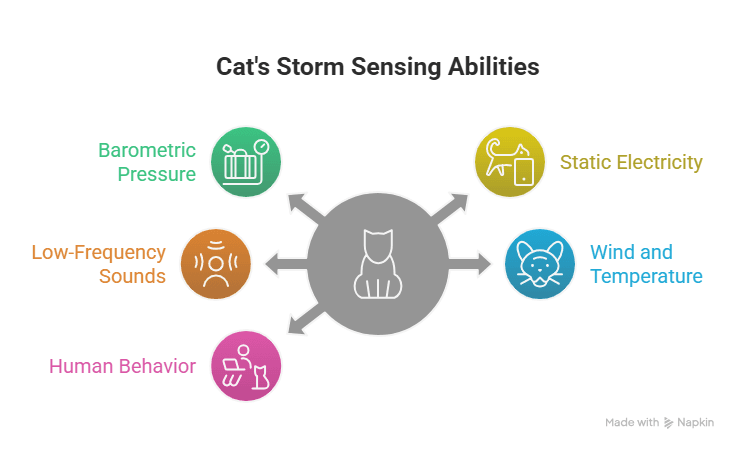
Introduction
If you’re a cat parent, you’ve probably experienced this: your cat starts pacing, hiding, or acting unusually clingy, right before a thunderstorm rolls in. And you wonder, almost jokingly, “Can Cats Sense Bad Weather?” It’s a fascinating question many cat owners ask when their feline seems to predict a storm before it hits.
Well, you’re not imagining it. Many cat owners report their feline friends behaving oddly just before rain, lightning, or even natural disasters. But can cats actually sense bad weather?
The short answer is yes, sort of. While they may not understand “weather” in the way we do, cats have incredibly sensitive senses that allow them to pick up on subtle environmental changes long before we do.
In this article, we’ll dig into:
– What cats actually detect before storms
– Why their behavior shifts
– What science says about animal weather sensitivity
– And how to help a weather-sensitive cat feel safe and secure
Let’s decode the instincts behind your cat’s inner weatherman (or weatherwoman).
How Cats Perceive the World Differently From Humans
To understand how cats might detect changes in the weather, it helps to understand just how different their senses are from ours.
Cats experience the world through:
– Smell: 14x more powerful than humans
– Hearing: Can detect high-frequency sounds up to 65,000 Hz
– Touch: Sensitive whiskers and paws feel air currents, vibration, and pressure
– Sight: Not just vision, but enhanced motion detection—even in low light
– Instinct: Deep evolutionary programming from their wild ancestors
These heightened senses allow cats to pick up on cues we may completely miss, like tiny shifts in barometric pressure, low-frequency rumbles, or static energy in the air.
So while they might not “know” a storm is coming in the way a weather app does, they can feel it—and respond accordingly.
Common Signs That Your Cat Senses a Weather Change
Every cat is different, but there are a few common behaviors that many owners notice right before (or during) bad weather:
– Hiding under beds, furniture, or in closets
– Clinginess or following you from room to room
– Restlessness—pacing, meowing, or acting unsettled
– Over-grooming or increased body licking
– Ears twitching, eyes wide, and low body posture
– Sudden bursts of energy followed by retreat
These signs may look like typical “cat mood swings,” but they often align with major shifts in the environment, particularly as a storm rolls in.
What Exactly Can Cats Sense Before a Storm?

Let’s look at some of the specific things cats are picking up on that might explain their sudden behavior changes before bad weather:
1. Barometric Pressure Changes
Atmospheric or barometric pressure drops as a storm approaches. This change can affect animals just as it affects humans (headaches or joint pain, anyone?).
Cats are more sensitive to pressure than we are. They may sense the drop in pressure and react with physical discomfort or confusion, especially if they associate that feeling with past storms, noise, or chaos.
Some may retreat, become clingy, or appear visibly alert and unsettled.
2. Static Electricity in the Air
Ever notice how your cat’s fur may puff slightly before a storm, or how they avoid certain rooms or carpets?
Before storms, the atmosphere becomes more electrically charged, creating a static buildup that some animals can feel on their fur. Cats are especially sensitive because of their fine, dense coats.
They may:
– Avoid surfaces that cause static shocks
– Hide in enclosed, grounded areas like closets or bathtubs
– Seems irritated or suddenly aggressive when touched
This isn’t fear—it’s discomfort.
3. Low-Frequency Sounds and Vibrations
Thunderstorms, heavy rain, and even hurricanes emit infrasound—very low-frequency sounds below the range of human hearing (typically under 20 Hz).
Cats, however, can pick up sounds far beyond our range. They may detect:
– Distant thunder long before we do
– Ground vibrations from approaching weather
– Subsonic rumbles that signal heavy rain, wind, or hail
These sounds may not register to us, but they can spook or alert your cat long before a storm is overhead.
4. Wind, Temperature, and Air Changes
Changes in wind speed or direction, humidity, or air temperature can signal upcoming bad weather. Cats may feel this through their:
– Whiskers, which pick up subtle air currents
– Nose, which detects changes in humidity or scent
– Ears, which register shifts in sound carried by wind
Some cats respond to these changes by hiding, while others become incredibly active or vocal—a form of instinctual alertness.
5. Changes in Human Behavior
Let’s not forget: cats are amazing observers of you.
If you rush to close windows, unplug electronics, or start prepping for a storm, your cat might mirror your behavior. They’re experts at noticing:
– Tone of voice
– Your pace or movements
– Changes in your routine or mood
If you’re anxious or alert, they may become anxious too, even before the first drop of rain falls.
Do Cats Make Good Weather Predictors?
Anecdotally? Absolutely.
Many cat owners report:
– Cats hiding hours before storms
– Avoiding certain rooms before lightning strikes
– Sleeping more on rainy days
– Becoming extra clingy before strong winds or downpours
Historically, animals—including cats, dogs, horses, and birds—have been used in folk weather prediction. In some cultures, a cat washing behind its ears was thought to predict rain!
But can cats “predict” weather like a forecast?
Not quite. They react to present cues—they’re not reading tomorrow’s forecast. Still, their behavior can serve as an early heads-up, especially in areas where sudden storms are common.
How Do Cats React to Different Types of Weather?
🌧 Rain & Wind:
Some cats become sleepy and withdrawn—others go into “zoomie mode.” Cats may respond more to the sound of wind or rain than the rain itself, especially if it’s hitting windows.
⛈ Thunderstorms:
The most obvious trigger. Some cats hide, tremble, or become vocal. Others may ignore it entirely. Thunder is often accompanied by multiple sensory triggers: static, sound, pressure, and your own reaction.
🌪 Hurricanes or Tornadoes:
Cats may become extremely anxious hours or even days in advance, especially if there’s a drastic drop in pressure. Owners in storm-prone areas report that their cats often act as “early alarms.”
☁ Overcast Skies:
Some cats seem to “mood match” dreary days with lethargy. Others become extra playful. This can be tied to light changes, as cats are very attuned to light-dark cycles.
How to Help a Cat That’s Sensitive to Weather
If your cat seems nervous or scared during storms, you’re not alone. Weather-related anxiety is very real for many cats, and it can be managed.
✅ Create a Storm-Safe Zone
➡️Choose a quiet, enclosed space (closet, interior bathroom)
➡️Add cozy bedding, a familiar toy, and a piece of your clothing
➡️Keep the door open so your cat can come and go freely
✅ Use White Noise or Soft Music
➡️Gentle background sound can mask thunder or wind
➡️Try calming cat music or ambient nature sounds
✅ Try Calming Products
➡️Feliway diffusers or sprays (synthetic calming pheromones)
➡️Calming collars
➡️CBD or vet-approved supplements (consult your vet first)
✅ Avoid Over-Soothing
It’s tempting to scoop up your anxious cat and smother them with comfort, but this can sometimes reinforce the anxiety. Instead:
➡️Speak calmly
➡️Avoid sudden movements
➡️Let your cat come to you
✅ Maintain Routine
Cats thrive on predictability. Try not to shift feeding, play, or sleep routines during storms if possible.
When Should You Be Concerned?
Occasional hiding or pacing before a storm is normal. But if your cat:
➡️Hides for long periods (hours after the storm is gone)
➡️Refuses to eat, play, or use the litter box
➡️Becomes aggressive or destructive
➡️Has other signs of chronic stress (over-grooming, vomiting, etc.)
…it’s worth a conversation with your vet or a feline behaviorist.
Your cat may have storm-related anxiety or be reacting to an underlying issue.
FAQs
Can cats sense earthquakes or natural disasters too?
There’s anecdotal evidence suggesting cats can sense earthquakes, volcanic eruptions, and tsunamis before they happen. This is likely due to their sensitivity to vibrations, pressure changes, and infrasound.
Why does my cat become more affectionate during rainstorms?
Some cats seek comfort during storms. The sound of rain may also encourage snuggling. It’s part survival instinct, part bonding behavior.
Should I create a designated storm shelter for my cat?
Yes, if your area gets frequent storms. A cozy, familiar spot with blankets, toys, and a water bowl can make a big difference in keeping your cat calm.
Also Read - Can Cats Sense When You're Sick? Understanding Your Feline’s Intuition
Conclusion
So, can cats sense bad weather? The answer is: yes, but not in the way we do.
Cats don’t predict the weather like meteorologists, but their powerful senses allow them to detect subtle environmental shifts that signal something big is coming.
Whether it’s pressure drops, static electricity, distant thunder, or simply your own pre-storm routine, your cat is taking it all in—and responding in their own way.
For some, that means hiding in a closet. For others, it’s curling up beside you until the storm passes. Either way, your feline friend is tuned in—more than you might realize.
And if their instincts send them running before the rain hits… maybe it’s time to close the windows, just in case.
Thank you for reading till the end.




